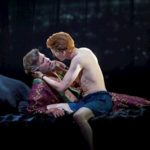 l-r: Thomas Hampson, Isaiah Bell
l-r: Thomas Hampson, Isaiah BellPhoto: Michael Cooper
At the Four Seasons Centre for the Performing Arts, Toronto, Ont.
Music by Rufus Wainwright
Libretto by Daniel MacIvor
Directed by Peter Hinton
Conductor Johannes Debus
Set by Michael Gianfrancesco
Costumes by Gillian Gallow
Lighting by Bonnie Beecher
Projection designed by Laurie-Shawn Borzovoy
Choreography by Denise Clarke
Cast: Joel Allison
Isaiah Bell
Ambur Braid
Samuel Chan
Gregory Dahl
Josh Fralick
Thomas Glenn
Thomas Hampson
Ben Heppner
Roger Honeywell
David Leigh
John Mac Master
Karita Mattila
Anna-Sophie Neher
Madelaine Ringo-Stauble
NOTE: As with my previous opera reviews, I’m reviewing Hadrian as a piece of theatre and not commenting on the music or the singing.
A ravishing-looking production, stylishly directed, but I wonder about the repetitive libretto.
Background. Composer Rufus Wainwright used the novel “Memoirs of Hadrian” by Marguerite Youcenar as his reference point for his opera. Hadrian was the Emperor of Rome from 117-128 CE. He was the man who built the wall in Britain (or Britannia as it was known then—very impressive is that wall when you see it up close). Hadrian was also known for the conflict with the Jews against the rise of monotheism. The information regarding the wall is absent from the opera. The business with the Jews is there as a plot point. What Wainwright and his librettist Canadian playwright Daniel MacIvor are exploring here is Hadrian living as an openly gay man.
The Story. Hadrian is mourning the death of his young lover, Antinous. He is sick with grief or with illness. There is also a mystery about how Antinous died and Hadrian wants to know. He is visited by two spirits: Emperor Trajan and his wife, the scheming Plotina. Plotina offers Hadrian a deal: she will grant him two selected nights to relive with Antinous in exchange for Hadrian learning the truth behind Antinous’ death and that Hadrian destroys the Jews. He agrees.
Hadrian chooses the day he first met Antinous, at a hunt, when Antinous saved Hadrian from a charging boar. We also see Hadrian and Antinous’ first night together. That affair lasted six years. The love between them is intense. This naturally pains Sabina, Hadrian’s ignored wife. She laments he never had a heart for her, but obviously has a heart for Antinous.
Court intrigue being what it is, we see how Antinous actually died by drowning in the Nile. Hadrian’s grief is profound. Plotina’s deal comes to an end as orders are sent out to destroy the Jews and Hadrian finally dies.
The Production. Director Peter Hinton and his creative team have produced a ravishing production focusing on the homoerotic. A line of bare-cheeked men face upstage, posed, reminiscent of erotic scenes from Roman art. Choreographer, Denise Clarke has created movement and dance that serve the narrative beautifully.
A huge projection of a bust of Antinous dominates the upstage right side of the stage. This is part of Hadrian’s memorializing of his lost love. Laurie-Shawn Borzovoy’s projections create images of waves of water, stars, the heavens and others suggesting the huge size of this created world.
Bonnie Beecher’s shafts of red light subtly pour down on a mound of ‘red’ sand. Is that symbolic of blood and the depleting of life—either Hadrian’s or Antinous? Don’t know, but that would make sense. Striking image.
The pace is languid because there is so much music to accommodate—it does not give over to quick entrances and exits. The most compelling scene is the first time Hadrian and Antinous first make love. Hadrian (a buff Thomas Hampson) in a rich robe, undone, lounges on a chaise. Antinous, (a toned Isaiah Bell) in a lighter robe, also undone, slowly approaches the chaise. Upstage are pairs of male dancers that Denise Clarke has choreographed into couplings and pairings that subtly reflect what is happening on the chaise. As the music slowly builds so does the passionate ebb and flow of Hadrian and Antinous’ body language in love making—aggressive, languid, passionate and breathless.
This is Daniel MacIvor’s first opera for which he has done the libretto. So much of it seems repetitive: “He loves. He loves. He loves.” Or comments on the stars. But then of course his words are serving the music. Just one of the many ways that opera has its own vocabulary and way of using the libretto to accommodate the music. But then MacIvor has Sabina (a heartbreaking Ambur Braid) comment to Hadrian that she has not been sleeping well and he would have known that “had he been near.” ) or words to that effect (because he’s been elsewhere with Antinous.) It’s a lyric that is economical, spare and so for of regret and sadness. Peter Hinton also has Sabina on the stage, standing alone, away from anyone, accentuating her isolation. Stunning effect.
So much of Hinton’s staging creates visual images that shimmer with emotion. One of the most vivid is Antinous falling off a structure into the Nile, caught by a group of men who then gently undulate the body as if it’s floating. Stunning.
Comment. I of course leave any comment on the merits of the music to others better qualified. But one has to admire Rufus Wainwright’s devotion to the art form of opera. Hadrian is his second opera and much grander than his first, Prima Donna. I’m sure there will be more.
Produced by the Canadian Opera Company
Remaining performances: Oct. 25, 27, 2018.
Running Time: 3 hours.
www.coc.ca